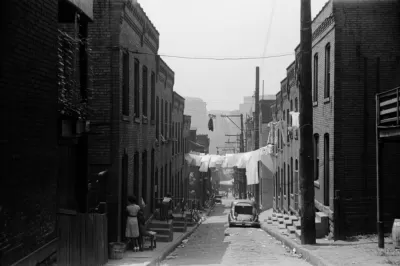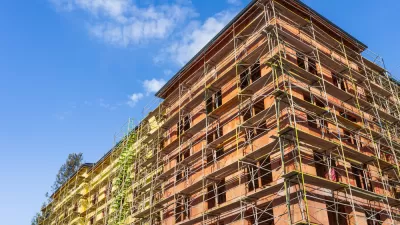A new journal article calls out the academic community of planning and urbanism for relying too much on the usual suspects when researching marginalization and inequality, and assuming too much about what makes a neighborhood "normal."

Junia Howell, a sociology professor with the University of Pittsburgh and Kinder scholar, has published a recent article in the journal Sociology Compass that exposes the "the unstudied reference neighborhood" that could contribute to a more complete understanding of inequality and marginalization.
An article by Leah Binkovitz provides insight into the implications of the study:
After naming some of the landmark pieces of neighborhood-focused research that have helped shape urban policy for decades, Howell notes, "with few exceptions, neighborhood studies only examine a small slice of urban neighborhoods." Over the years, scholars have spent time in Italian 'slums,' Puerto Rican neighborhoods and majority black neighborhoods, Howell notes, but white, middle-class neighborhoods "are rarely studied in the literature."
Repeatedly associating specific neighborhoods with inequality and marginalization, "reinforces the notion that impoverished and marginalized communities are distinct and exist in stark juxtaposition to all other communities," says Howell in a quote from the article.
As a result, scholarship suffers, policy, and public discourse. Howell discusses the implications of the article in the video below, but Binkovitz also gives a lot more to think about in the sourced article.
FULL STORY: The Unstudied Neighborhood

Planetizen Federal Action Tracker
A weekly monitor of how Trump’s orders and actions are impacting planners and planning in America.

Congressman Proposes Bill to Rename DC Metro “Trump Train”
The Make Autorail Great Again Act would withhold federal funding to the system until the Washington Metropolitan Area Transit Authority (WMATA), rebrands as the Washington Metropolitan Authority for Greater Access (WMAGA).

The Simple Legislative Tool Transforming Vacant Downtowns
In California, Michigan and Georgia, an easy win is bringing dollars — and delight — back to city centers.

The States Losing Rural Delivery Rooms at an Alarming Pace
In some states, as few as 9% of rural hospitals still deliver babies. As a result, rising pre-term births, no adequate pre-term care and "harrowing" close calls are a growing reality.

The Small South Asian Republic Going all in on EVs
Thanks to one simple policy change less than five years ago, 65% of new cars in this Himalayan country are now electric.

DC Backpedals on Bike Lane Protection, Swaps Barriers for Paint
Citing aesthetic concerns, the city is removing the concrete barriers and flexposts that once separated Arizona Avenue cyclists from motor vehicles.
Urban Design for Planners 1: Software Tools
This six-course series explores essential urban design concepts using open source software and equips planners with the tools they need to participate fully in the urban design process.
Planning for Universal Design
Learn the tools for implementing Universal Design in planning regulations.
Smith Gee Studio
City of Charlotte
City of Camden Redevelopment Agency
City of Astoria
Transportation Research & Education Center (TREC) at Portland State University
US High Speed Rail Association
City of Camden Redevelopment Agency
Municipality of Princeton (NJ)





























